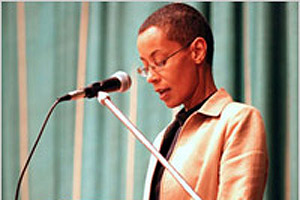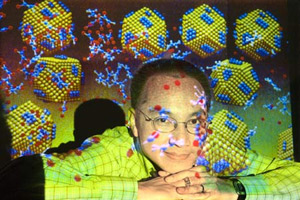Focus on America
Iraqi, American Poetry Reading Bridges Cultural Divides

“One of the treasures of poetry is that it allows full equality to all artists and freedom of expression in what defines a truly democratic society,” said U.S. Ambassador to Iraq Ryan Crocker January 15 at the first annual Iraqi/American Poetry Reading, sponsored by the U.S. Embassy in Baghdad in partnership with the Iraqi Tawasin Cultural Society.
The spirit of humanity embodied in the universal language of poetry momentarily surmounted the political and economic challenges facing this nation as members of the Iraqi literary community joined American and other coalition representatives at the al Rasheed Hotel event.
Iraqi poet Mohammed Rasim Kasim, president of the Tawasin Cultural Society, described poetry in similar terms -- as a “cultural bridge between East and West,” and as a “universal language that … sensitizes emotions … [and] distances human kind from … daily sadness and burdens.”
Crocker, who holds a university degree in literature, read two works by contemporary Iraqi poets who have achieved international renown: Fadhil al Azzawi and Mahdi Muhammed Ali. Crocker’s reading, as well as others, was accompanied by four Iraqi musicians playing the guitar-like oud and drums.
Crocker was joined at the event by the Polish ambassador to Iraq, General Edward Pietrzyk, whose arm was still in bandages after being seriously wounded in a terrorist attack in Baghdad in October 2007.
The U.S. Embassy’s Cultural Affairs Office director, Patrick Ventrell, recited Robert Frost’s famous poem “Stopping by Woods on a Snowy Evening,”an evocative meditation on duty and on love of nature that earned Frost the reputation as America’s “people” poet.
Ventrell said the poetry reading was “especially remarkable” because “this is one of the first times Iraqis and Americans could openly share their interests in each others cultures. It was just a wonderful public display of mutual understanding.”
Diane Siebrandt, an archeologist who works as a cultural heritage liaison officer in Ventrell’s office and who helped organize the event, said the embassy works closely with the Iraqi Ministry of Culture. Recently, she said, the Cultural Affairs Office sent six Iraqis on a “Performing Arts in U.S. Society” International Visitors Leadership Program. The participants had a chance to engage with Americans in the areas of music, theater, art and dance and visit museums, schools, universities, and other arts and education institutions, she said.
U.S. Embassy spokeswoman Mirembe Nantongo, a Tanzanian-born, United Kingdom-educated U.S. Foreign Service officer, read a selection from American poet Elizabeth Bishop.
Bishop traveled widely, mostly in Latin America, and lived in Brazil for 15 years before she died in 1979 in Boston. Travel and changing landscapes, both metaphorically and literally, provided themes and images that pervaded her poetry as well as her existence.
In “The End of March,” read by Nantongo, Bishop describes a stroll along a cold and windy beach in New England that becomes a metaphor of a life in decline still yearning for the “lion sun” of youth and past happiness.
For Iraqi poet Ahmed Jalil Alwayes, regret and despair are emotions that pervade his existence but must be resisted. In his poem, “Only for Everyone Do I Set Ablaze the Rose of Peace,” he declares, “If, despite the grief, he embraces the perfume of this soil that splashes the sparrows above each alleyway and door, I will bear the brownness of my age and extinguish this ruin.
“I belong to the date palm, in which the entire people of Iraq takes refuge. … It fills me with tenderness -- the remains of my forefathers. I cleanse the sun of love,” he recited. Fellow Iraqi poet Omer Al Saraay also read his work, “Opera of a City.”
The Tawasin Cultural Society, headquartered in Baghdad, was established in 2004 with the idea of building bridges of cultural understanding between Eastern and Western societies. The society is composed of local poets, artists and musicians who work to establish cultural connections through workshops, seminars and art festivals.
Most of its activities take place in Iraq, but the society held successful seminars and programs in Germany as well. The society seeks to create stronger connections between Iraqis and Americans, especially those currently residing in Iraq.
Its motto, “Art in service of peace and freedom,” is put in practice through their free expression of views and artistic aspirations in poetry, theater, music and visual arts, and its encouragement of others to do the same. The society also encourages and supports women’s rights and youth development programs.
Recently on Focus on America
Innovative Use of Online Networks Transforming Society
 If you're going to keep up with Ben MacKrell, you'll need two things: a cell phone and an account at Facebook or a similar Web site that falls under the loose term "social networking."
If you're going to keep up with Ben MacKrell, you'll need two things: a cell phone and an account at Facebook or a similar Web site that falls under the loose term "social networking."
Young Innovator Profile: Michael Wong
 Describing his idea to use gold to clean up toxic waste, Michael Wong says, "I admit it does sound crazy." Wong plans to combine gold with palladium — an even more precious metal — to treat polluted groundwater beneath waste dumps and contaminated factories and military sites. "It not only works faster [than current methods], but a hundred times faster," Wong says, "and I bet it will be cheaper too."
Describing his idea to use gold to clean up toxic waste, Michael Wong says, "I admit it does sound crazy." Wong plans to combine gold with palladium — an even more precious metal — to treat polluted groundwater beneath waste dumps and contaminated factories and military sites. "It not only works faster [than current methods], but a hundred times faster," Wong says, "and I bet it will be cheaper too."
Innovation Transfers Benefit Public and Private Sectors
 Fashion design that might one day be adapted to protect the Army?
Fashion design that might one day be adapted to protect the Army?
That is possible because of innovative work by a Cornell University student whose design has caught the eye of U.S. Army scientists. Designer Olivia Ong put together two ensembles using silver nanoparticles in 2007 to eliminate health threats from microbes. The garments also incorporate palladium nanoparticles designed to reduce the effects of air pollutants.